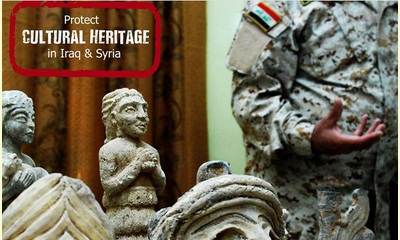|
|
L'UNESCO appelle à la mise en place de zones de protection culturelle en Syrie et en Iraq
an article by Centre d'actualités de l'ONU
La Directrice générale de l'Organisation des
Nations Unies pour l'éducation, la science et la
culture (UNESCO), Irina Bokova, a appelé
mercredi à la création de « zones de protection
culturelle » autour de sites du patrimoine en Syrie
et en Iraq, à l'ouverture d'une conférence
internationale sur ce thème au siège de
l'organisation à Paris. 
Photo: UNESCO
click on photo to enlarge
Mme Bokova a suggéré de commencer par la
Grande mosquée omeyyade, un site
emblématique situé dans la ville syrienne d'Alep,
inscrite sur la Liste du patrimoine mondial. « Il
n'est pas trop tard pour agir », a-t-elle dit.
La Directrice générale a dénoncé la persécution
des minorités, les attaques contre le patrimoine
culturel et le trafic illicite de biens culturels, qui «
s'inscrivent dans une stratégie de nettoyage
culturel extrêmement réfléchie et d'une rare
violence ». « Le concept de nettoyage culturel
décrit ce qui se passe sur le terrain », a ajouté le
Conseiller spécial du Secrétaire général pour la
prévention du génocide, Adama Dieng.
Irina Bokova a ajouté qu'il « n'y a pas de solution
purement militaire à cette crise. Pour lutter contre
le fanatisme, il faut aussi renforcer l'éducation, qui
aide à se défendre contre la haine, et protéger le
patrimoine, qui aide à forger une identité collective
».
L'Envoyé spécial du Secrétaire général pour la
Syrie, Staffan de Mistura, et le Représentant
spécial du Secrétaire général pour l'Iraq, Nickolay
Mladenov, ont souligné la nécessité d'intégrer
l'éducation et la culture aux mesures d'urgence,
ainsi que l'aide humanitaire, en vue de protéger
les droits de l'homme et les populations civiles
vulnérables.
Dans un message destiné à la conférence, le
Secrétaire général des Nations Unies, Ban Ki-
moon, a affirmé que « la protection du patrimoine
culturel est un impératif de sécurité ».
Nikolay Mladenov a insisté sur le fait que le
patrimoine de la région appartient à l'humanité
toute entière. Il a dénoncé les terroristes qui
recourent au génocide et à l'esclavage des
femmes, ainsi que leur mépris flagrant pour les
vies humaines et les droits de l'homme dans leur
destruction de l'État de l'Iraq.
Le Premier Vice-Président du Parlement d'Iraq,
Cheikh Humam Hamoudi, a appelé les pays
souhaitant venir en aide à sa nation à sauvegarder
l'âme de l'Iraq. Il a assuré le soutien du
gouvernement iraquien en faveur de la diversité
culturelle et du pluralisme dans tous les domaines,
y compris les médias.
Parmi les autres mesures concrètes abordées lors
de cette conférence, qui a réuni près de 500
décideurs politiques, conservateurs, universitaires,
experts en conservation et membres du public, a
figuré la nécessité de mettre en œuvre la
Convention pour la protection des biens culturels
en cas de conflit armé de 1954 et ses protocoles
additionnels, ainsi que de mettre fin à l'impunité
des attaques délibérées contre le patrimoine
culturel, reconnu comme un crime de guerre en
vertu du Statut de Rome de la Cour pénale
internationale.
Les participants ont exprimé un fort appui en
faveur de la proposition d'une interdiction
internationale du commerce d'antiquités en
provenance de Syrie, conformément à la
recommandation de l'Équipe de surveillance des
sanctions du Conseil de sécurité de l'ONU.
|








|
DISCUSSION
Question(s) related to this article:
How can there be a political solution to the war in Syria?,
* * * * *
LATEST READER COMMENT:
For other articles on this subject, click here .
In the following article, Wilhelm Langthaler, a Co-convener of PeaceinSyria.org comments on the spirit emerging from the “All Sides Consultation for Political Solution” in Vienna.
Now that the “All sides Consultation for a Political Solution in Syria” is accomplished and is being recognized by all the participants as a success that deserves continuation, the time has come to draw a balance not only of the conference itself, but also of its wider significance. The very fact that around two dozen people from the most diverse and conflicting backgrounds of Syrian society came together and consulted how to overcome the civil war tearing apart the country is extraordinary. But the spirit emerging from the debates reaches far beyond the objective of this single event, giving hope that a movement for a political solution is gaining momentum.
Exchange among the people – not power-brokering
First of all, let us recall the aim of the “All Sides Consultation for a Political Solution” which took place in the “Peace Castle Schlaining” close to Vienna, Austria, from 7-10 March, 2014. The idea was to give a voice to Syrian society in its full diversity, voices emerging from the people who have been silenced and excluded by the powerful. It was not intended to hold negotiations between the conflicting sides and their global and regional sponsors as has failed in Geneva. A consultative forum of personalities not directly representing the sides involved but indeed representing the societal richness was called upon to explore ways to stop the catastrophic bloodshed.
Thus we were not in search of sophisticated and well-balanced formulae of compromise pleasing the foreign powers involved (something which might, however, be necessary to reach in other places), but to give answers concerning how the full rights of the people might be guaranteed. The quest for these rights is what is thought to have sparked the conflict and is at the same time key to ending what has turned into a fratricidal war pitting the components of society against the other, a conflict additionally fuelled by massive international involvement. As Naser al Ghazali, one of the Syrian members of the preparatory committee hailing from Daraa, put it in his introduction: “Democratic rights are not negotiable. . ...more.

|
|









